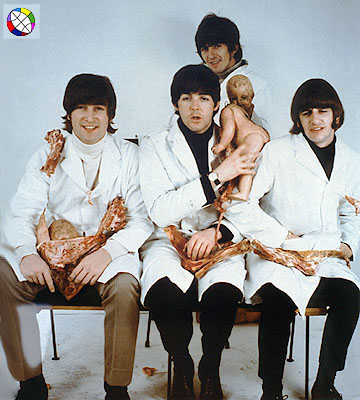Call this a mashup?!?


One of the (few) good things about Christmas is the way that it gives you the opportunity to buy CDs and books for others but consume them first yourself, and thus feel both satiated and generous. That's if you plan things properly, and don't end up running down to the twenty-four hour supermarket at six o'clock on Christmas morning to buy Dad beer and Mum chocolates, as certain ne'er do wells I am acquainted with have a habit of doing.
Being far more organised than that, I am currently listening to a copy of Love, the official Beatles mashup album, which will in a couple of weeks' time be wrapped up and handed over to some poor naive victim of my generosity. (Actually, now I think about it, I didn't even buy the album - it's somebody's else's gift which they stashed around the flat I'm squatting in preparation for wrapping, and which I've helped myself to. Does that not make me even more detestable?)
Anyway, to get to the (very negligible) point of this post: I'm up to track eleven, which is a remastered 'Help', and I've already decided that all the secondary literature - that means reviews, to those of you in the real world not going mad writing a PhD thesis - about Love rather miss the mark. Reviewers have either raved about the way that George Martin and his sprog have dragged the fab four into the twenty-first century by embracing the brave new art of the mashup, or else railed against the damage done to the integrity of classics like 'Yesterday' and 'Strawberry Fields' by the Martins' remixing and sampling. Take a cold shower, folks.
The problem with Love is that it is not, really, a mashup album. Mashups are supposed to yoke two (or three, or four, or five) wildly different songs together to create a third composition able to rival the originals - something fresh and strange and a little dangerous. What the Martins have given us is something more akin to those awful 'party mix' tapes from the 1980s, which strung together scores of one minute versions of current hits (remember Ray Parker Jr's 'Who Ya Gonna Call?', anyone?). There is a little tepid remixing, which reminds me of the work Bill Laswell did with Miles Davis on Panthalassa, and a couple of rather tasteless samples (a wailing ambulance on Julia. Subtle, George...). It's all a long way from the sort of sense of musical adventure that the fab four showed when they cranked out 'Tomorrow Never Knows' and 'A Day in the Life' (come to think of it, isn't there an argument to be made that 'John's 'Revolution #9' was the first ever mashup?) Really, this is not much more than a Greatest Hits Remastered album.
If I might be allowed to get philosophical for a moment, I think that Love is an album that proves that the authentic performance of a piece of music - or the authentic re-presentation of any pre-existing piece of art, for that matter - must include something new and original, something which challenges and redefines the original work. Mere reverence is not enough. It is by being too loyal to the fab four that the Martins betray them. Get the Grey Album instead.

4 Comments:
This is supposed to be a great album.
OK, it *is* cool to hear the harmonies on 'Because' (first track up) without any instruments in the abckground, but wasn't that version on one of the Anthology albums? I remember they played it over the credits at the end of American Beauty, too...
No, Revolution number nine was music concrete, not a mashup. Making a song by sampling bits of noise that isn't music already as opposed to taking two-three songs to built a new song up out of.
True. But what about 'Cry Baby Cry' off the White Album?
Post a Comment
<< Home